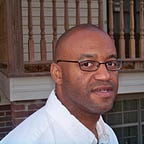Honoring Nashville’s Freedom Fighters
Note: I made these comments for an award presentation to the Nashville Civil Rights Veterans Association at the Southern Human Rights Organizers’ Conference on December 15, 2023.
My name is Sekou Franklin and it is an honor to present the Fannie Lou Hamer Human Rights Award to the Nashville Civil Rights Veterans Association on this day of December 15, 2023. For those of us in Nashville — and we are biased — we believe the Nashville Freedom Movement was one of the most important, if not the most important of the locally-based, civil rights struggles of the 1950s and 1960s.
This movement, spearheaded primarily by young people, transformed Nashville and the entire South, primarily through nonviolent resistance that was intergenerational and intersectional.
The Nashville Movement produced what I like to call the “special forces” or the shock troops of the Modern Civil Rights Movement. In addition to forcing Nashville to become the first major city to desegregate its downtown business district, the Nashville Movement had one of the largest contingents in attendance at the founding meeting of the Student Nonviolent Coordinating Committee in April 1960.
The Nashville Movement was the primary anchor of the Freedom Rides of 1961. In fact, the Freedom Rides would have collapsed if not for Nashville’s young adults and student activists. Many young people joined the Freedom Struggle in the face of extreme racialized violence, the real possibility of death, school expulsion, wholesale jailing, and political ostracism from moderates and middle-class leaders.
An abbreviated summary of Nashville movement activities demonstrates its broad reach:
· Between 1957 and 1960, there were several targeted bombings of Nashville’s civil rights community and more instances of racial violence. In response to the targeted attacks, particularly during the 1957 school desegregation campaign, Black activists escorted children and their parents to their schools. This tactic, although unnamed at the time, was a precursor to unarmed civilian protection initiatives such as “accompaniment” that are currently sponsored by Nonviolent Peaceforce and other groups working in combat zones.
· When the Freedom Rides collapsed in 1961and the Nashville group took up the campaign, the Department of Justice tried its best to discourage the young activists from continuing the effort. Nonetheless, the activists defied Robert F. Kennedy’s Department of Justice and carried on with the Freedom Rides.
· In addition to the jailing of Nashville’s civil rights leaders in the city’s desegregation campaign, many ended up at the infamous Parchman Prison in Mississippi during the Freedom Rides.
· Nashville was one of the first movements that was co-led by women and men with Diane Nashville and John Lewis playing perhaps the most prominent roles. This was an intentional practice of what contemporary observers call intersectionality.
· Adult-student/youth connectivity were an asset — not a hindrance — in the Nashville movement. Rev. Kelly Miller Smith, Rev. Andrew White, and others in the Nashville Christian Leadership Council actively supported the young activists. Nashville modeled an intergenerational organizing collaboration that ran counter to what occurred in other localities.
· Two of Nashville’s movement leaders, Marion Barry and John Lewis, served as chairpersons of the Student Nonviolent Coordinating Committee. (Barry was the first chairperson of the ‘Temporary Student Nonviolent Coordinating Committee’.)
· One of Nashville’s influential activists, Bernard Lafayette, was a mainstay in the Selma campaign. He was in Selma at least a year before the groundswell of the campaign, although this is excluded in Ava Duvernay’s Selma movie. He actually negotiated Malcolm X’s visit to Selma. He also was one of the signature leaders of the Chicago Freedom Movement in 1966, and organized residents to address lead poisoning in the city’s slums. And he was the national coordinator of the Poor Peoples’ Campaign in 1968.
· John Lewis, Diane Nash, and James Bevel also played prominent roles in the Selma campaign.
· Rev. James Lawson trained most of the young leaders in Nashville. His nonviolent education training was expansive throughout the South. Before arriving in Nashville, he trained some members of the Little Rock 9. Later, he hosted a nonviolence session in the home of Fannie Lou Hamer. He was one of the core organizers of the Memphis sanitation workers’ strike in 1968.
· Rev. Lawson also scouted Birmingham for the SCLC in the lead up to the 1963 campaign; and Diane Nash and James Bevel were principal organizers in the campaign.
· CT Vivian also came out of the national movement. He went on to become the national field director for the Southern Christian Leadership Conference and was almost killed challenging the racially segregated beaches of St. Augustine, Florida.
· One can look at the work of Kwame Leo Lilllard, a well-known activist in the Freedom Struggle, who later established the largest African-centered festival in the Mid-South, which is still vibrant despite his death in late 2020.
· One can look at the work of Gloria McKissack, King Hollands, Matthew Walker, Catherine Burks, Frederick Leonard, Rip Patton, Jim Zwerg, Patricia Jenkins Armstrong, Mary Jean Smith, Etta Simpson, Allen Cason, Jr., William B. Mitchell Jr, Susan Herrmann, Frankie Henry, Professor Vivian Henderson, and others who played important roles in the movement.
Undoubtedly, the Nashville collective impacted dozens of local movement campaigns from the beaches of Florida to the Alabama Black Belt to the Mississippi Delta. Nashville Freedom Fighters played key roles in grand movement events such March on Washington, Chicago Freedom Movement, and Poor Peoples’ Campaign. They gifted the Freedom Movement with a multi-layered theory of organizing that synthesized strategic nonviolence, intersectionality, and intergenerational collaboration.
So, on this day, we celebrate the contributions of the Nashville Civil Rights Veterans Association and the legacy of the Freedom Struggle in Nashville.
